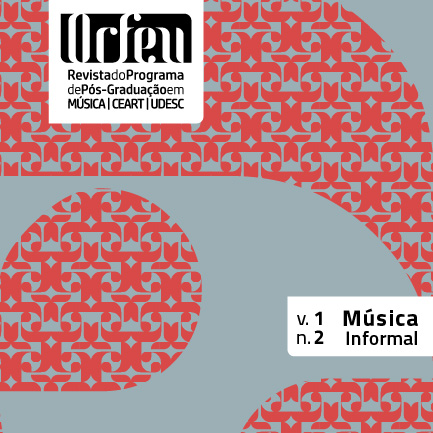Processos de consistência e contextos na improvisação livre: aproximações preliminares
DOI:
https://doi.org/10.5965/2525530401022016006Parole chiave:
improvisação livre, contextos, processos de consistênciaAbstract
Apesar da grande quantidade de estudos dedicados ao assunto, a expressão “improvisação livre” mantém ainda hoje uma definição muito abrangente e imprecisa. Atualmente há, no Brasil e no mundo, muitas manifestações artísticas que incluem procedimentos que remetem, de forma explícita ou não, à livre improvisação. Um dos desafios que se coloca é, por um lado, a procura de uma definição do que seria comum entre as múltiplas e diversificadas práticas que se localizam no amplo território da improvisação livre ou que dela fazem uso e, por outro, do que seria singular e específico a cada uma destas práticas. É necessário definir se há realmente um território comum que abrange todas estas práticas para, posteriormente segmenta-lo em sub categorias com suas identidades próprias. É necessário também, desvendar os processos de construção de consistência em cada caso. No presente texto pretendo fazer um levantamento preliminar tendo em vista os objetivos acima delineados. Me interessa também discutir em que medida e de que forma estas manifestações interagem com determinadas configurações sociais, culturais e políticas contemporâneas ou, em outras palavras, determinar em que medida a improvisação livre pode ser pensada, tanto como um sintoma, quanto como uma linha de força que contribui de forma específica para a configuração de certos ambientes e contextos socioculturais contemporâneos relacionados às práticas criativas.
Downloads
Riferimenti bibliografici
BORN, Georgina and DEVINE, Kyle. Music, Technology, Gender and Class: Digitization, Educational and Social Change in Britain in Twentieth Century Music, 12-2, Cambridge University Press, 2015.
BRITO, Maria Teresa Alencar de. Por uma Educação Musical do Pensamento: Novas Estratégias de Comunicação, Tese apresentada ao Programa de Pós-Graduação em Comunicação e Semiótica da PUC-SP, como exigência parcial para obtenção do título de Doutora em Artes, 2007.
Costa, Rogério L. M. O músico enquanto meio e os territórios da livre improvisação, Tese apresentada ao Programa de Pós-Graduação em Comunicação e Semiótica da PUC-SP, como exigência parcial para obtenção do título de Doutor, 2003.
Costa e Schaub, Expanding the concepts of knowledge base and referent in the context of collective free improvisation, in Anais do Congresso da Anppom de 2013.
DELEUZE, Gilles e GUATTARI, Felix. Mil Platôs, Editora 34, São Paulo, 1997.
FALLEIROS, Manuel Silveira. Palavras sem Discurso: Estratégias Criativas na Livre Improvisação, Tese apresentada ao Programa de Pós-Graduação em Música da ECA-USP como exigência parcial para obtenção do título de Doutor em Artes, 2012.
PRESSING, Jeff. Cognitive Processes in Improvisation, in Cognitive Processes in the Perception of Art, ed. W. Ray Crozier and Anthony J. Chapman, Amsterdam: Elsevier, 1984.
PRESSING, Jeff. Psychological Constraints on Improvisational Expertise and Communication, in In the course of Performance: Studies in the World of Musical Improvisation. Ed. Bruno Nettl and Melinda Russel Chicago, University of Chicago Press, 1998.
ZUMTHOR, Paul. Performance, Recepção, Leitura, Cosac Naify, São Paulo, 2007.
Downloads
Pubblicato
Come citare
Fascicolo
Sezione
Licenza
Copyright (c) 2017 ORFEU

TQuesto lavoro è fornito con la licenza Creative Commons Attribuzione 4.0 Internazionale.






